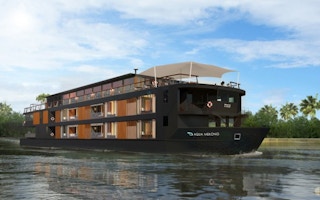Starting this month, a new cruise ship by luxury travel company Aqua Expeditions will ply the Mekong River between Vietnam and Cambodia, putting a spotlight on tourism in the region.
The travel firm said it plans to offer luxury travellers an eco-tourism experience that matches the company’s successful ventures in the Amazon River.
Designed by Saigon-based architectural firm Noor Design and built in a local shipyard in Vietnam, the Aqua Mekong is the latest addition to Aqua Expeditions’ two other ships that regularly cruise the Peruvian stretch of the Amazon River.
The firm is owned and founded by Italian-American Francesco Galli Zugaro, who worked for a leading Galapagos cruise company before setting up his own in 2007.
The 62.4 metre-long cruise liner will have 20 suites decorated and designed using local materials and fabrics, and is “developed with standards set well above the environmental protection requirements of local regulations,” Aqua Expeditions told Eco-Business.
The ship will run from Siem Reap down the river to My Tho, near Saigon, and will stop in Phnom Penh along the way and vice versa.
“Aqua Mekong will allow our guests to experience, first-hand, the colourful and varied cultures, religions and timeless traditions that I have discovered along the Mekong. Travelling deep into its remote tributaries, our guests will be able to learn about the history and ecosystem of this important Southeast Asian waterway,” noted Galli Zugaro.
The travel firm said it will offer guests the opportunity to learn about the Vietnamese and Cambodian rural communities living along the banks of the river. Travellers will be able to cycle through local villages and explore remote flooded forests, among other adventures.
“
We will be doing everything we can to ensure that Aqua Mekong is as environmentally friendly as possible
Francesco Galli Zugaro, founder and CEO, Aqua Expeditions
The environmental impact of the Aqua Mekong will be minimised through a sustainable travel policy, which includes fuel efficiency, low-emission engines, food safety, sustainable sanitation systems and waste management, explained the US-based firm.
The ship runs using a specialised wet exhaust system to minimise carbon dioxide emissions and is equipped with engines that have very low emissions as certified by the California Air Resource Board. These measures comply with the latest International Maritime Organisation and the United States Environmental Protection Agency standards, the firm added.
It also claims that it uses cleaning and sanitation products that ensure lower consumption of water and energy, and reduce the chemicals and waste released into the environment. All waste is treated on-board in fully contained storage tanks in compliance with US standards, where 100 per cent of the treated water can be safely discharged into the rivers. Other waste material which cannot be processed on-board is collected for recycling or responsible disposal at disembarkation.
The challenges of sustainable tourism
Governments and international organisations believe that sustainable tourism can be an important tool in the area’s community development and can help address climate change, create jobs and alleviate poverty in the region. This opens huge prospects for travel and tourism operators like Aqua Expeditions to participate in its development.
The International Labour Organisation (ILO) reported that in some provinces in Vietnam, communities have increased their earnings by developing products such as traditional weavings, spices, tea gift baskets and home stay services for tourists. “In Vietnam, tourism is expected to generate 5.6 million direct and indirect jobs by 2020, which is about 10 per cent of the total jobs in the country,” said Gyorgy Sziraczki, ILO’s Vietnam Director.
In Cambodia, the tourism sector generated more than US$2.5 billion in national revenue last year and created more than 500,000 direct jobs and many other indirect jobs, tourism minister Dr Thong Khon told an international conference on September 17.
The Cambodian government, in collaboration with the UN World Tourism Organisation and UNESCO, adopted the Phnom Penh Declaration at the conference, which highlights the importance of community-centred tourism in promoting sustainable development.
But the region faces numerous challenges: Environmental groups, for example, have documented the risks from plans to construct several dams for hydropower along the Mekong River, which threatens the livelihood of fishing communities and the freshwater sources for irrigation of nearby agricultural communities, as well as the biodiversity in the region.
In addition, the intergovernmental body Mekong River Commission has highlighted the impact of climate change on the Mekong, including issues of rising sea levels and the increasing risks of natural disasters such as floods and droughts.
Ame Trandem, Southeast Asia programme director for International Rivers and a long-time advocate for the protection of the Mekong, said that despite the immense economic and cultural importance of the river, it remains under threat from the dams built and planned for the Lower Mekong mainstream in Cambodia, as well as in Laos.
Trandem pointed out that such projects are expected to severely impact the river’s ecosystem and fisheries, as well as the hydrological systems of the Mekong River Basin, which meant blocking important sediment flows needed for riverbank stability. “These changes may be detrimental to navigation, especially in the Mekong Delta, and the future sustainability of the Aqua Mekong,” said Trandem.
Aqua Expeditions stressed it is committed to identifying and helping to meet the needs of Cambodians and Vietnamese living by the Mekong River. This includes environmental conservation and protection of natural resources surrounding these communities, and supporting education as well as environmentally-friendly ways for these people to earn their living.
It did not state any specific activity, but promised to implement community engagement similar to its programmes in the Amazon, which include community support to encourage the protection of endangered species and working directly with village artisans to promote the replacement of animal products.
Galli Zugaro told Eco-Business: “We will be doing everything we can to ensure that Aqua Mekong is as environmentally-friendly as possible.”

















